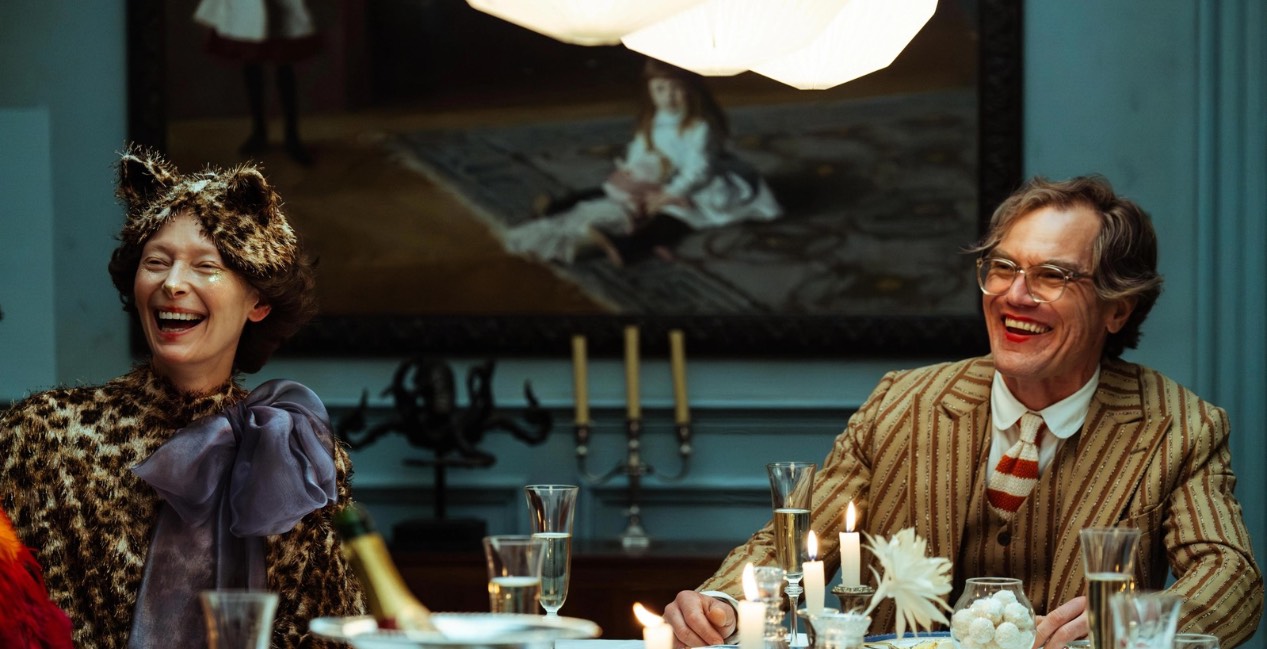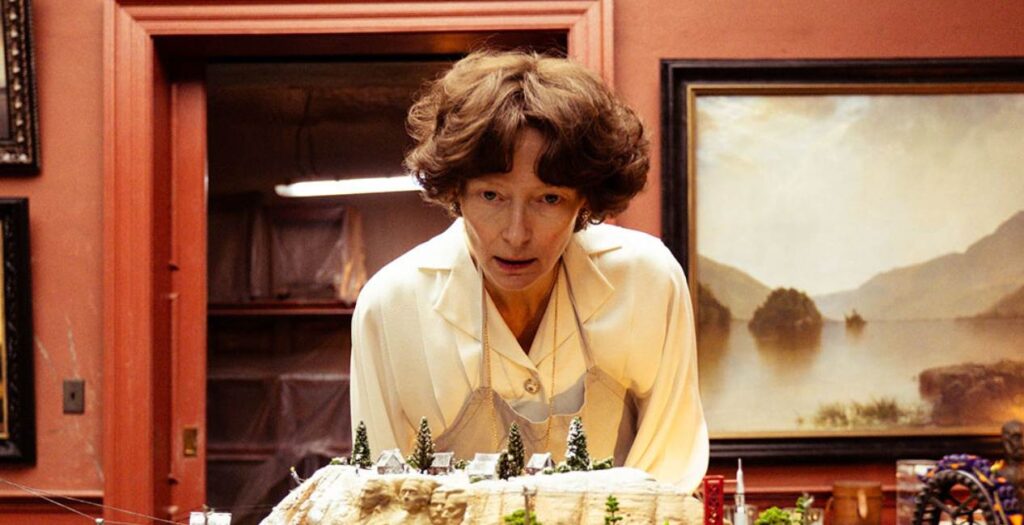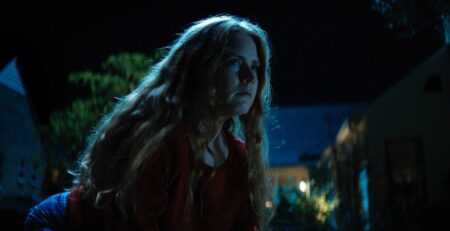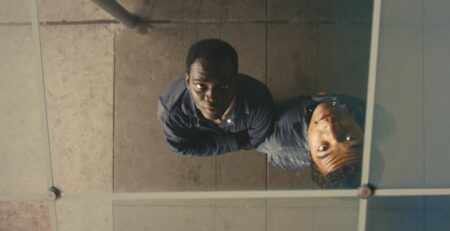On the surface, Joshua Oppenheimer’s fiction feature debut, The End, seems to have it all. An excellent ensemble, beautifully stark production design, and graceful camerawork fill the frame. But for all its ambition, it never rises above a single, 248-minute metaphor. Strokes of bravura are constantly undercut with repetition, rendering Oppenheimer’s promising post-apocalyptic musical an exercise in tedium. Worse yet, it makes the cardinal sin of having little memorable music.
While The End doesn’t lack vision, its promising, eccentric genre mashup is far too clunky and rigid to land with purpose and impact. It’s an experience that sings and talks a lot but says very little. Much like the air-tight bunker it takes place in, it quickly barricades itself from deeper insights.
The End follows the supposed last remaining family on earth, as they reside in a decorated bunker underneath a salt mine after environmental catastrophe has made outside life uninhabitable. George MacKay stars as the curious 20-year-old son of the household, who was born in the bunker and is fascinated by stories of the world’s past. He spends his time writing a highly questionable biography of his father (Michael Shannon), a former energy baron, while his mother (Tilda Swinton) obsesses over the maintenance of the artwork adorning their lavish abode. Yet, when an injured outsider (Moses Ingram) arrives at their door, her presence threatens the family’s affluent and sheltered existence, forcing them to confront the terrible things they’ve done to survive and perpetuate the world’s end.
With The End, Oppenheimer continues the important discourse of his seminal documentary, The Act of Killing, tackling the perils of collective denial, inaction, and our tendency to re-write history to dilute our roles in perpetrating mass ills. Where Oppenheimer’s documentary unearthed surprising and sickening revelations, The End continues to hammer in the same conclusions across its bloated runtime. As a result, the film only scratches at the surface, with each character and musical number often repeating the same, if interesting, talking points. While admirable in its commentary, it doesn’t land with the impact it believes it carries.
Oppenheimer’s characters use music to block out the horrors and trauma of their pasts—often defined by their jovial and theatrical timbre. The cadence, style, and lyrics take a page from greats like Stephen Sondheim, full of layers and clever wordplay. Unfortunately, they are in the service of very little, compounded by the sheer lack of musical diversity. Each number blends into one another, virtually indistinguishable in form, rhythm, and substance.

The film’s opening tune is incredible, full of sumptuous violins and winds that echo the beauty of a world only seen in paintings and miniatures crafted by MacKay’s nameless son. The familial chorus induces goosebumps as they softly bellow “We thrive in our happily ever after!” We are cast into this beautifully awkward, deranged existence with whimsy, heart, and wonder—a juxtaposition that’s not only powerful but wholly unique.
Yet, the spell quickly fades, its luster continually dimmed by the interchangeable and virtually identical musical numbers that follow it. By the film’s end (no pun intended), the audience is hard-pressed to name a single song. As The End trudges along, it struggles to sound, feel, and say anything different from its opening moments. Its classification as musical feels more like a gimmick than anything crucial to its messaging. The result is a profoundly unsatisfying experience.
Yet despite how dull and bleak it gets, the ensemble shines. MacKay exudes range and nuance as a naïve, excitable young man who is illuminated by the thought of past human existence but grows weary of his parent’s continued denial and lies. His performance hits every note with grace while still having room for humor. MacKay continues to prove himself as one of the most daring and exciting voices in independent cinema.
The same applies to Swinton, whose cringe-inducing mother continues to unmoor herself from reality when confronted by newcomer Ingram who is also haunted by a similar traumatic experience. Shannon treads new territory in his first cinematic musical and rises to the task as a character who is equal parts charming and slimy, as he enlists his son to write his hagiography.
Bronagh Gallagher and Lenni James also shine as friends of the family, who, like the others, struggle with their pasts. Yet as colourful as the cast is, they also brim with wasted potential. Every character shares similar arcs, is forced to wrestle with similar emotions, and sings similar ballads, often feeling like retreads of one another than varied personalities.
Expert craftsmanship has clearly gone into The End—the solemnly beautiful salt mine, gorgeous lighting, and cascading camerawork are a testament to that. But none of it can hide how one-note and monotonous the experience feels. It’s easy to admire Oppenheimer’s musical vision but difficult to love. The End recalls the musical greats of yore with none of the power and panache.
The End screened as part of the 2024 Toronto International Film Festival and will be released by NEON and Elevation Pictures.
The End
-
Rating - 5.5/105.5/10
TL;DR
Expert craftsmanship has clearly gone into The End—the solemnly beautiful salt mine, gorgeous lighting, and cascading camerawork are a testament to that. But none of it can hide how one-note and monotonous the experience feels.





